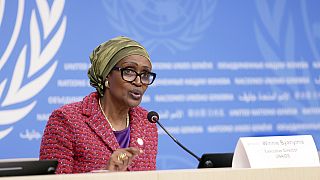South Africa
Dozens of protesters gathered outside the Sandton Convention Centre in Johannesburg to lend their voice as the CoP17 meeting of the Conference of Parties to the Convention on International Trade in Endangered Species (CITES) kicked off in South Africa.
CITES #CoP17, the most important conservation event you’ve never heard of is about to start https://t.co/XdQlMvFb8w via
— CITES (CITES) September 23, 2016washingtonpostpic.twitter.com/HgukC4Zvfi
Wildlife experts from around the globe will be discussing the future of the world’s most endangered wildlife species, including elephants and rhinos, whose populations have dramatically declined over the years due to poaching and trafficking.
#PressRelease: Global consortium strengthens efforts to tackle #wildlifecrime – ICCWC in Focus
— CITES (CITES) September 24, 2016CITES#CoP7: https://t.co/i82IpeRfoj pic.twitter.com/Rza9adXIiD
“What we need is appendix one, we need a total ban on all trade in ivory. We need all of the lions on appendix one, we need all of the rhinos protected, we must not have any down listing. This is now, these species, they are looking extinction in the face and it’s our fault,” said Jan Creamer, President of Animal Defenders International
Inside the venue, it was a different atmosphere.
“Illegal trade in wildlife, including poaching, presents significant challenges and threats to the environment, including undermining the potential benefits arising from legal trade that contributes significantly to socio-economic upliftment and development,” said South African President, Jacob Zuma.
“It is about reviewing what we have been doing to meet these challenges and determining what more must be done. And we have much to report to this CoP. Significant progress has been made since we last met in 2013, politically, financially and technically”, said CITES Secretary General, John Scanion.
The conference will run until 5th October and will also consider proposals to provide more protection to ray and shark species.
The meeting will tackle 62 different proposals coming from wildlife experts around the world, concerning some 500 species.
Most of these proposals seek greater protection for endangered species, demanding transfer of the species from a less-protective appendix to a more protective one.
CITES was born in 1975 as a protection mechanism for wild animals and plants against over-exploitation for commercial purposes.
The treaty has been signed by 182 countries as well as by the European Union – only North Korea, Haiti, Western Sahara (disputed territory), South Sudan, Turkmenistan and East Timor remain out of the treaty.












Go to video
African gut study reveals urbanization threatens microbial diversity
01:54
South Africa's independent mechanics join forces to compete with big companies
01:48
South Africa launches vaccination drive to combat foot-and-mouth disease outbreak
11:16
Angola hosts U.S.-Africa summit amid calls to revive trade ties {Business Africa}
01:00
Pix of the Day: June 19, 2025